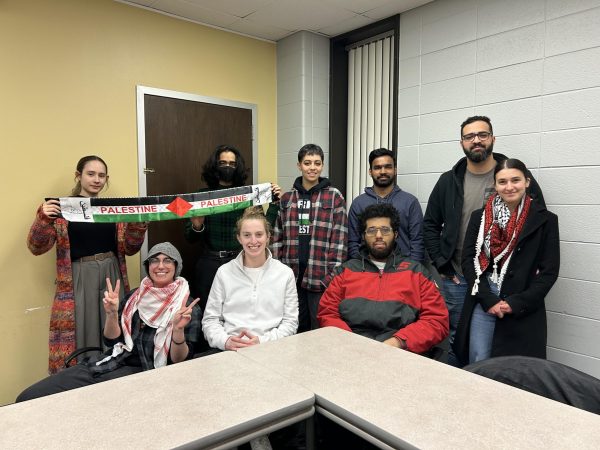Social justice advocate speaks at PNW
Lambda Pi Eta and the Union for Democratic Communications, two student organizations headed by Burton Lee Artz, professor of media arts, hosted writer and activist Medea Benjamin at Lawshe Hall Tuesday, Nov. 1. Benjamin came to PNW to discuss her new book, “Kingdom of the Unjust: Behind the U.S.-Saudi Connection.”
The event began with an introduction of Benjamin and her platform by representatives from both student organizations that sponsored the event: graduate student Raquel Williams of Lambda Pi Eta and graduate student Christian Lutz of the Union for Democratic Communications. Benjamin then went to the front of the room to discuss her experiences and how she developed the idea for her newest book.
Benjamin has been an advocate for social justice for more than 40 years. She has published nine books, and her articles appear regularly in several news outlets, including The Huffington Post. She talked about her experience growing up during the Vietnam War and how it was a motivation for her to become a social activist. According to Benjamin, the attacks on the World Trade Center in 2001 were also a catalyst in her career as an activist. After 9/11, she co-founded the group “Code Pink,” a peace-oriented group created by women for women to oppose the Iraq War and future wars that the group deemed unnecessary. The group’s name was inspired by the color-coded security alerts President Bush established to address national security. Before the U.S officially invaded Iraq, Madea and 14 women went to Iraq to further understand the culture of the country.
Benjamin’s book on Saudi Arabia aims to educate readers on America’s relations with the nation, including the U.S.’s lack of involvement in the Saudi Arabian government’s instances of infringing on international human rights, which Benjamin attributes to the fact that Saudi Arabia is the No. 1 weapons purchaser of the U.S and one of the leading oil exports of the world. Benjamin also talked about the current conflict between Western nations and the Islamic religion, the primary religion of Saudi Arabia and the religion by which its theocracy is ruled. She specifically spoke about the radical Islamic group ISIS and its role in the current Middle Eastern wars.
“Don’t call this a version of Islam. Call it a perversion of Islam,” Benjamin said in regards to ISIS.
After Benjamin concluded her talk, Lutz gave a brief description of the Union for Democratic Communication’s goals and passed around a sign-up sheet for all those in attendance who might be interested in joining.
“We take very critical approaches to communication and to media, advocate for the creation of structures to promote democratic communication and work with faculty and area organizations to facilitate discussion and promote activism on campus and in our community,” Lutz said of the Union.
The event then turned into a 15-minute open discussion on the topics addressed during Benjamin’s talk. After the group discussion, Benjamin signed and sold copies of “Kingdom of the Unjust: Behind the U.S.-Saudi Connection.” Lutz and Williams were also available to speak to the attendees about their respective organizations.




